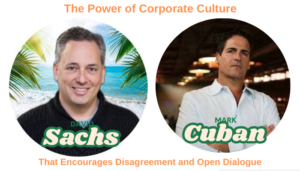16 Oct The Power of Corporate Culture That Encourages Disagreement and Open Dialogue
Every country has some unique attributes that differentiate it from other nations. One of the unique traits of the US that made her great is ‘freedom of speech’.
 Teams, organizations, and cultures that encourage and reward freedom of speech outperform, outcreate, and out-innovate those that aren’t.
Teams, organizations, and cultures that encourage and reward freedom of speech outperform, outcreate, and out-innovate those that aren’t.
Obviously, no one consciously hates to experience growth and progress. The problem is that few are courageous enough and willing to create the right environment to enjoy the rewards of
creativity and innovation.
Don’t expect to have highly innovative people who challenge the status quo and entertain new and exotic ideas without creating and nurturing a culture that allows them to speak their mind freely.
At this point, you may be wondering and asking: “Where are you taking this?” I’m almost there. Just bear with me.
I listen to audiobooks and long-form podcasts whenever I take a long drive or walk.
Last week, I was listening to the All-In podcast while driving back from VA. The main reason I follow this platform is to learn what is happening in the investment and
technology innovation worlds.
This time, however, the hosts interviewed Mark Cuban. The purpose of this video isn’t to share every lesson I learned from the conversation. They covered so many grounds, and it’s impossible to capture everything in this short clip.
But I’d like to share what stood out the most for me: The head butting between David Sacks, who roots for Donald Trump and Mark Cuban who supports Kamala Harris for the US President.
These two serial entrepreneurs advocated for their favorite candidate for the upcoming November election. It was a very heated debate. If you don’t understand the US culture, you may presume that when these two men meet in person again, they will fistfight. You may at least assume that they may not speak to each other, let alone get along and work together.
I grew up in a subculture in the eastern part of Ethiopia, Harar where using vulgar languages is the norm. We used to swear hundreds of times a day without engaging in physical fights. Whenever we fought physically, we never held grudges. Whether you win or lose, after the fight, you speak to each other. When you meet next time, you hangout as if nothing happened.
 Of course, when I enrolled at Addis Ababa University, I struggled to get along with students from other parts of the country. Slowly but surely, I began dropping curse words from my vocabulary. Initially, it was hard. I didn’t feel myself…
Of course, when I enrolled at Addis Ababa University, I struggled to get along with students from other parts of the country. Slowly but surely, I began dropping curse words from my vocabulary. Initially, it was hard. I didn’t feel myself…
Here is an interesting fact. When I returned to my hometown at the end of the first academic year, many of my old friends ‘disowned’ me by saying: ‘you’re no more one of us’. Like it was the custom, they gave me a nickname and began calling me ‘Shewaye’. That meant I’m from the region of Shewa, not Harar. Back then, you would be ashamed for being labeled Shewaye.
Coming back to the debate between Mark and David, if you lived enough in the US, the way they were arguing is typical among high performers. If I’m not mistaken, either both or Mark used the F word, at least, once.
Here are a couple of points I’d like to share with people who may not fully understand the US culture:
1. These two very successful entrepreneurs have equal love for their country, but they’ve totally different ideas concerning the direction the country should take. In a culture where open dialogue is encouraged, it is likely that you will find people from the same group having different positions. In this case, both David and Mark are high-earning individuals. Regardless, they have differing ideas about how the country should move forward into the future.
2. Though they disagreed, both demonstrated respect for one another. I’m sure, when they met again, like we used to do back home in my hometown, they will greet each other as if nothing happened. They may even use sense of humor and make fun of each other about their public argument.
3. Here is also what makes America exceptional. Whoever wins in November, these two gentlemen will reach out to the winner and congratulate her or him. Likewise, there is a high likelihood that the next president will also involve both Mark and David in their future administration. Or at least, seek their advice in the areas of their expertise.
I’m not a politician. I’m an entrepreneur and expert in the fields of organizational and leadership development. I’m using the headbutting between Mark and David to inspire entrepreneurs and leaders to create and nurture a culture that encourages disagreement.
Only insecure leaders demand agreement all the time.
Smart teams and organizations don’t want to be jailed by the status quo and demonstrate loyalty to mediocre ideas. They create an atmosphere where their people feel safe to disagree and air their opinions without fear of ridicule and retribution. By allowing their people to exercise freedom of speech, they benefit from the best ideas that win. They intentionally and proactively create and nurture a corporate culture that intentionally incentivizes organized disagreement.
They encourage their people to share their thoughts even if it means disagreeing with the leadership and what is the norm. As a result, everyone on the team feels heard, appreciated, and respected. They unleash their full potential, create, and innovate, making such a robust culture a win-win for all parties…
 Here is a great example. New York based multibillion dollar Hedge Fund company, Bridgewater, founded by Ray Dalio, has a signature culture called Radical Transparency.
Here is a great example. New York based multibillion dollar Hedge Fund company, Bridgewater, founded by Ray Dalio, has a signature culture called Radical Transparency.
Some Ivy League universities in the US have studied the company’s corporate culture to understand how the culture was built and sustained. What is more? Many companies attempted to copy and paste Bridgewater’s culture. Unfortunately, few succeeded.
Many failed because of some strong reasons one of which is the inability to create a safe environment. Inhabitants of the culture do not engage in PRODUCTIVE disagreements to challenge the status quo, question mediocre ideas, and so on without feeling unsafe.
The lack of ground rules to combat DISORGANIZED agreement resulted in a toxic environment where few members belittle, undermine, or dominate others in the name of disagreement…
What about you?
- Can you see the benefits of a culture that encourages open dialogue?
- If so, what are you going to do to create such a culture at home, within your team,
organization, and/or your community?
By the way, don’t hesitate to reach out if you would like us to help you create and sustain a vibrant culture that encourages and incentivizes transparency. We can help you create a pro feedback culture where your people, throughout the hierarchy, exchange feedback to improve
productivity and collaboration.
To learn more about how we can support you and reach out for a one-on-one conversation, please reach out via [email protected]
Go to our website to learn more about our services: www.TheAtoZInstitute.com
To watch the video:
